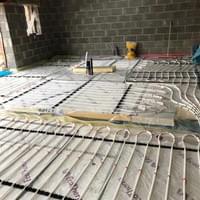


- Central Heating
- Gas - LPG - Oil
- Renewable Energy Heating
- …
- Central Heating
- Gas - LPG - Oil
- Renewable Energy Heating


- Central Heating
- Gas - LPG - Oil
- Renewable Energy Heating
- …
- Central Heating
- Gas - LPG - Oil
- Renewable Energy Heating

Renewable Energy Heating North Yorkshire
Phil France Plumbing and Heating provide the specification, integration and maintainance of renewable energy heating technologies for homes and businesses across North Yorkshire, including air source heat pumps, ground source heat pumps, solar PV for electric generation and solar thermal for water heating.
Renewable Energy Heating Services
We are qualified to specify, integrate and maintain renewable energy heating equipment
From a new build commission to integrating a renewable energy heating component within an existing central heating system, Phil France and his engineers provide a range of professional, microgeneration renewable energy technology services, including ground and air source heat pumps for heating and ventilation to solar panels for electricity generation and heating water. Phil France covers both domestic and commercial customers needs.
Our North Yorkshire service area covers all towns ...
Scarborough, Whitby, Filey, Bridlington. Snaiton, Malton, Helmsley, Pickering, Thirsk, Skipton, Tadcaster, Guisborough, York, Harrogate etc ...
We are MCS Certified - but what does that mean ?
MCS is a standards organisation that creates and maintain standards that allows for the certification of products, installers, and their installations. They certify low-carbon products and installations used to produce electricity and heat from renewable sources – and you should always look for the MCS mark for reassurance that your installer is certified.
MCS is a also mark of quality. Using an MCS certified installer ensures that equipment meets good standards of performance and that installers are technically safe and competent.
MCS certified Installers undergo a rigorous vetting process to demonstrate that they adhere to these Standards and in doing so demonstrate a commitment to quality. We are also a member of a Consumer Code (RECC) which means strengthened customer protection for you
Also, If your renewable energy technology is eligible for a government incentive, you will need to be able to provide MCS certification by an installer to claim this.
If you are thinking of adopting renewable energy heating technology for your home or business ...
1. It must be specified, installed and maintained correctly
It is important that small-scale generation equipment is specified, installed and maintained correctly, not only for you as an individual consumer, of course, but also for the development of the renewable energy sector at large. Bad experiences will damage the reputation and credibility of the sector.
To ensure you have a good experience, you must know what to look out for. Of course, most consumers are not technical experts, and nor do you need to be. But you do need accurate information and enough time to understand what it is you are buying. You must be clear about what your expectations are. In particular you should be clear about the typical price range and likely performance of the generator, and what this is likely to deliver for you in financial terms.2. Think - why do you want to generate your own energy?
You may want to save the planet, save yourself money or simply enjoy the idea of generating your own electricity or heat.he bullet points below give you some things to consider. Broadly speaking, you will save more CO² emissions the higher up the list you plan to be.
- Heating your space and water using renewable instead of conventional electricity.
- Heating your space and water using renewable instead of oil-fired heating.
- Powering your lights and appliances with renewable instead of conventional electricity.
- Heating your space and water using renewable instead of gas-fired heating.
- Heating your space and water using combined heat and power instead of gas-fired heating.
Whatever your motives for wanting to generate your own energy, you should think about energy efficiency first. You should make sure you are as energy efficient as possible, or you will end up wasting the precious renewable energy you go on to generate.
3. Understand your current energy usage
It helps if you have an idea of the amount of energy you use in your home or business. There are some useful on-line tools that help you calculate your usage taking into account your house-type and occupancy. You should make sure that you feed in the information about your actual consumption from your fuel bills (gas, electricity, oil &c.). Both gas and electricity usage are measured in kWh (kilowatt hours). It is important that you have an accurate idea of your total expenditure on energy before you install your own generator.
The company you are dealing with must provide you with written estimates of the anticipated performance of the generation system it recommends for you. They should make it clear whether it is based on data specific to your property, or whether it is based on a similar or ‘typical’ property. You should expect the company to be interested in your actual energy usage, and so lack of interest on their part should give you cause for concern.
You should compare this to your current total expenditure to calculate whether the generator will save you money and, if so, how much. Based on information about the Government’s incentive schemes, and some assumptions about interest rates and future energy prices, you can calculate the likely period it will take you to ‘pay back’ your up-front investment.
4. Some general rules of thumb
Here are some important points to bear in mind before you sign a contract:
- If you are not on mains gas, then it is likely that you will get financial value from generating your own heat, for example from biomass heating, a ground- or an air-source heat pump or from solar thermal water heating.
- Remember that heating hot water generally accounts for about 30% of your total heating and hot water costs, while ‘space’ heating accounts for the remainder.
- If you have a large, un-shaded, predominantly south-facing roof space, you are fortunate as this is ideal for solar panels, either for heating water or for generating electricity. A south-west or west-facing roof would also be suitable, though a little less productive.
- If you are planning to build your own home, or extend your existing home, then again you are fortunate. It is cheaper to incorporate small-scale generation systems at the time you are building, rather than ‘retro’ fitting them later.
- If you’re considering installing a biomass boiler be sure you have a reliable source for, and somewhere to store, the wood / wood chips / wood pellets that will fuel it.
Contact Phil France Plumbing & Heating today
Office : 42-46 Ewart Street, Scarborough. North Yorkshire. YO12 4EP
Tel : 01723 639146
Mob : 07971 194912
Email : admin[at]philfrance.co.uk
Or send a message via the secure form
Our service area is the YO postcode areas of North Yorkshire ... Scarborough, Whitby, Filey, Bridlington, Snaiton, Malton, Helmsley, Pickering, Thirsk, Guisborough, York etc ...

Copyright © Phil France Plumbing & Heating Ltd.
Company Registration 09459254
Registered Office:
42-46 Ewart Street, Scarborough. North Yorkshire. YO12 4EP






